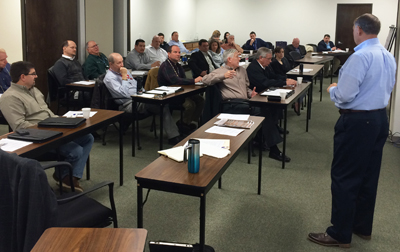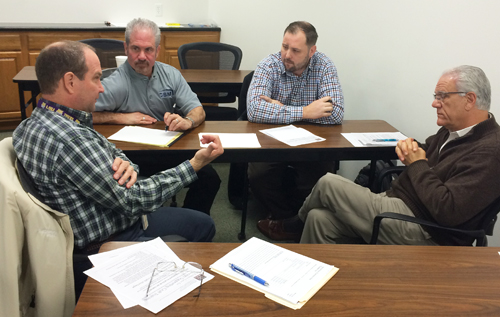 Construction in the United States faces a challenge that’s been at the center of an ongoing discussion for most of my career in the industry. But, the challenge of sustaining a workforce has grown from a mere nuisance into a problem that could threaten the viability of recently announced projects. More importantly, it could stand in the way of our country’s ability to reclaim its rightful position as the world leader in manufacturing. It is shameful that we have not held that position in two decades.
Construction in the United States faces a challenge that’s been at the center of an ongoing discussion for most of my career in the industry. But, the challenge of sustaining a workforce has grown from a mere nuisance into a problem that could threaten the viability of recently announced projects. More importantly, it could stand in the way of our country’s ability to reclaim its rightful position as the world leader in manufacturing. It is shameful that we have not held that position in two decades.
The ABC board of directors in Houston recognizes the importance of tackling this problem head-on. That’s why ABC’s Industrial Committee will look into opportunities and recommend board action on the issue of the availability of qualified construction craft professionals and the need for coordinated workforce development in the Greater Houston Area.
The Industrial Committee hosted a brainstorming session recently including 18 member organizations and identified four critical themes and barriers that must be addressed. They are:
- Improving the efficiency, coordination and “rate of progression” for craft professional training.
- Improving craft career development by creating ownership by each craft professional member, improve transparency and transferability of accomplishments and records across multiple contractors.
- Address construction’s poor image and improve the reach and impact of recruiting entrants into the industry.
- Increasing contractor and owner participation and funding of these initiatives.
The Industrial Committee has developed a three-step process to formulate recommendations to the full ABC board.
Step 1 is to determine the keys to success and envision “what success will look like.” This creates context and a framework for Step 2, which will examine current practices that must be sustained to produce the desired “future state” and current practices that must be mitigated or eliminated. Step 3 will have the participants design recommendations that sustain the enablers, neutralize the inhibitors, and encapsulate the barriers in a way that moves the industry stakeholders to take coordinated action and sustain a sense of urgency.

The industrial committee has begun work on increasing contactor and owner participation and funding of these initiatives. We conducted the first work session March 5th when we discussed the desired “future state” by framing the key success factors and critical principles for coordination and collaboration amongst contractors and owners. We will begin the second step on March 26th. We have made contact with the East Harris County Manufacturers Association to determine how we can expand our efforts to include and collaborate with our Houston area Industrial Customer base.
We have been invited into the construction sector council of the Greater Houston Partnership GHP to work in with commercial construction and GHP’s Upskill Houston initiative. During a recent construction sector council session, we had the opportunity to make contact with representatives of public organizations and community colleges whose partnerships will be critical to building lasting solutions to address the shortage and development of construction craft professionals.
Some key things we have learned:
- We must create parallel strategies that focus on locating, educating, attracting and retooling the underemployed in our country and our region in order to make an immediate impact in the expected shortage of construction craft professionals and at the same time focus doing the same with parents and students in K9 though K12 as they represent the sustainable future of our industry. That means we have to retool our image!
- We must keep our message clean and simple and ensure that everything we do is “through the eyes of the prospective entrant” into our industry. We need to drive redundancy out of the process and simplify access to education about our industry and to skill and career development opportunities. Our industry has got to have one place to serve as a collection of answers that potential employees seek, not the answers we think they need to find.
- We need the prospective, nascent, and experienced craft professionals to own and take charge of defining their career aspirations and tracking of their developmental progress. The contractor and owner community needs to shift from a mentality of providing jobs to enabling careers and establishing the means and methods that support sustainable individual growth across an industry population of craft professionals who are becoming increasingly more transient and less tenured with only one company.
- We need all organizations (including the non-profits) who provide fee-based training, skill assessments, and developmental programs and classes to quit being positional (posturing to protect a revenue base) and start being co-operative in streamlining and simplifying the process.
Collectively, contractors, owners, community colleges and independent training organizations need to find a way to ensure the appropriate level of hands-on experience matches the certification a student receives. A certified welder or instrument tech who has never been on a commercial or industrial project will likely not be hired until appropriate experience has been satisfied.
Appropriating funds for solving this issue must be an equitable proposition. Contractors cannot fund it alone, and owners should not be asked to be the sole source of funding. We must find a principled way for all stakeholders to share in the expense of the solution(s).
We cannot talk our way out of a problem we have behaved our way into! This is no longer an intellectual exercise. We need collaboration, urgency and action now.
Change is inevitable.
Our country needs you.
Our community needs you.
Our youth needs you.
One must choose to influence this discussion through participation or risk becoming a victim of the action designed by others. The time is now and we need your help. Please contact the ABC Houston Chapter, or AGC Houston Chapter, or Construction Citizen for ways you can become involved.


